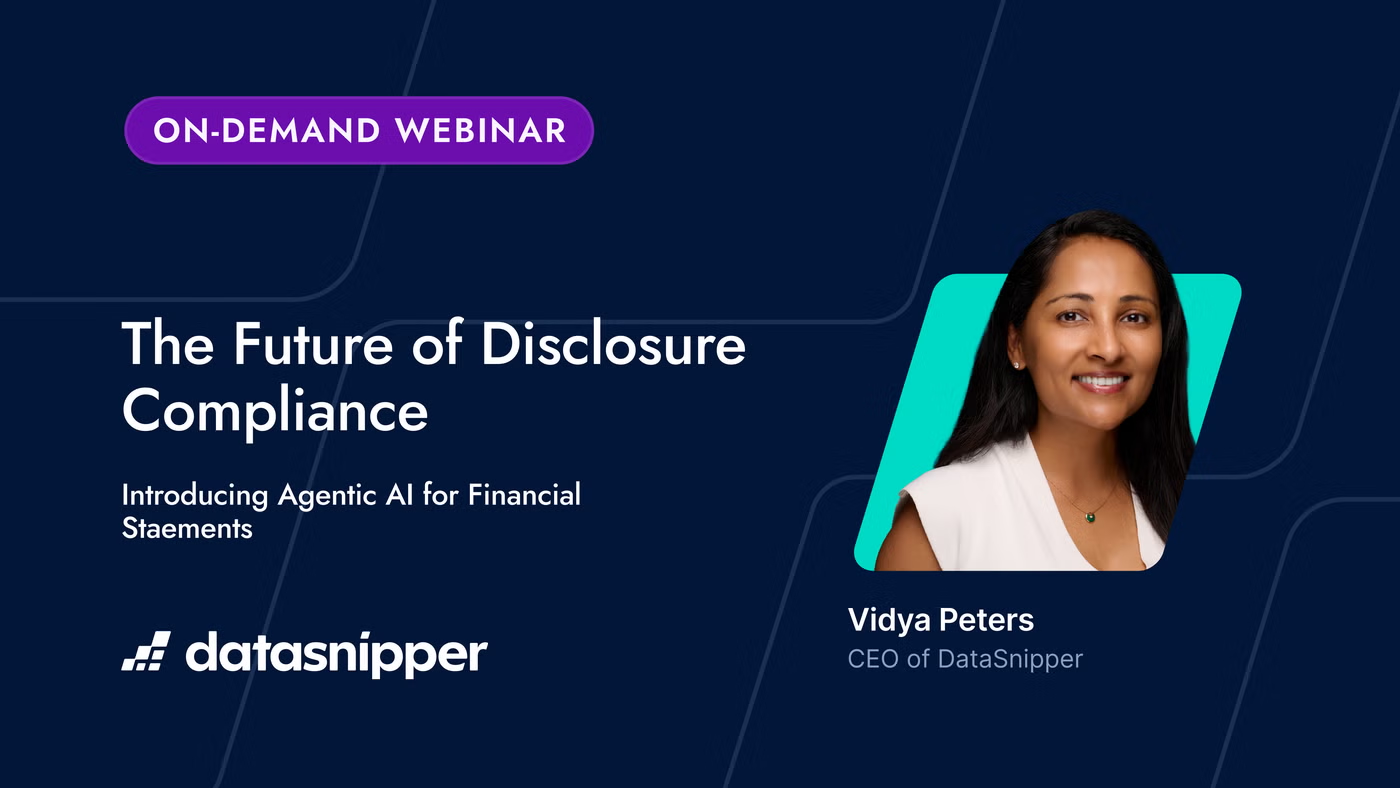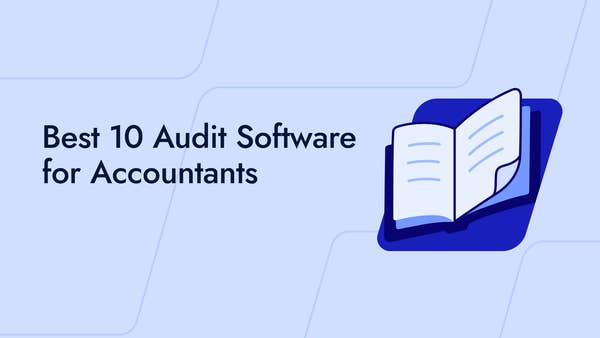- /
- Blog
The Future of Disclosure Compliance: How Agentic AI Is Elevating Audit and Finance Work

Earlier this month, DataSnipper hosted a live conversation exploring how Agentic AI is transforming the way audit and finance teams approach disclosure compliance. The session, moderated by Remco de Vries, VP of Demand Generation, brought together Vidya Peters, CEO of DataSnipper, and Thilo Richter, VP of Product and Engineering, to discuss how new agentic workflows are reshaping what’s possible in financial statement review and preparation.
But beyond the product itself, the conversation offered a deeper look at the future of work in audit and finance — from how AI is changing the profession’s talent dynamics to why human judgment will always remain central to trust.
Here are the key themes and takeaways from the session.
1. AI is making the profession exciting again
“For multiple years over the last decade, we were seeing fewer and fewer people join the profession,” she said. “And for the first time in history, we’re seeing that trend reverse. Because of AI, we’re now able to attract more talent into audit — they believe the work is fun again. It’s more interesting, it’s more strategic. It’s actually making this profession highly desired again.”
AI, in other words, is not replacing people — it’s reinvigorating the purpose and appeal of the work itself.
2. From generative to agentic: A new phase of AI
“Essentially, for each of these questions, we’re launching agents that actually parse documents and find the evidence to get to a high-quality answer,” he explained. “If you just roll a document into a generative model, it won’t be good at answering these questions.”
This shift — from passive generation to active, evidence-based reasoning — reflects how AI in audit must evolve. Agentic systems don’t just generate text; they perform tasks with transparency, ensuring every conclusion is traceable and auditable.
3. Human-in-the-loop is non-negotiable
Throughout the discussion, Peters emphasized that human judgment remains irreplaceable, especially in audit where so much of the work lives in shades of gray rather than black and white.
“Audit is not binary,” she explained. “Eighty percent of the work floats in the gray area. Humans have to make the judgment calls — assessing risk, understanding client relationships, and determining what truly matters.”
She went on to note that while AI can accelerate analysis, it can’t replicate the credibility, experience, or ethical responsibility of an auditor:
“Auditors are hired not just for task completion — otherwise a calculator could do that — but for their credibility and training. Until the SEC starts deposing AI models, humans are here to stay.”
It’s a clear stance: the future of audit is human-led, AI-empowered.
4. Ethics and oversight must evolve with AI
When asked about ethics and AI, Peters made a strong case for maintaining human accountability in every agentic workflow.
“If we believe the premise is always human in the loop, then the ethical responsibility lies with the human,” she said. “There should never be swarms of agents autonomously doing things without oversight. Ethics continue to live with us.”
That human-centered philosophy runs through every discussion about agentic AI — the goal is not autonomy, but augmentation. AI should extend the reach of human expertise, not remove it from the equation.
5. The IT bottleneck and the reality of shadow AI
The conversation also addressed one of the most pragmatic challenges companies face today: IT and procurement bottlenecks.
Peters pointed to a growing gap between policy and practice when it comes to AI adoption.
“Any AI tool you want to bring into a company is often stuck with IT security and procurement for months,” she said. “Meanwhile, employees aren’t waiting. 60% of AI users in a company were never authorized to do so — and IT doesn’t realize that their processes are so onerous they’re no longer practical. The bus is leaving the station.”
Her point underscored an uncomfortable truth: when innovation moves faster than approval processes, employees will find their own workarounds. The solution isn’t to clamp down harder, but to enable safe, transparent experimentation that aligns innovation with governance.
6. Introducing Disclosure Agents: Trust, transparency, and traceability
Finally, Richter brought the conversation full circle by explaining how Disclosure Agents embodies these principles in practice.
“You can put a list of disclosure checklist items into ChatGPT and get answers,” he noted. “But if you want to review every single answer, validate and approve or reject, ensure it’s correct and auditable, and have a trace of everything — that’s not the right tool.”
Disclosure Agents bridges that gap by pairing agentic automation with full audit trails, ensuring that efficiency never comes at the cost of accuracy or integrity.
Looking ahead
The conversation between Peters and Richter made one thing clear: the next era of audit and finance will be defined by collaboration between humans and intelligent agents.
Agentic AI represents not just a technological evolution, but a philosophical one — one that redefines what it means to trust, verify, and lead in the age of automation.
As Peters summed it up, “The humans are here to stay. The firms are here to stay. And with the right technology, the work we do will only get more meaningful.”
Getting started with Agentic AI
The next era of audit and finance will be built on collaboration — between people, data, and intelligent technology. Agentic AI isn’t about replacing judgment, but amplifying what makes auditors invaluable: their insight, integrity, and influence.
At DataSnipper, we’re helping teams reimagine what that future looks like.

.png?width=600&quality=70&format=auto&crop=16%3A9)
